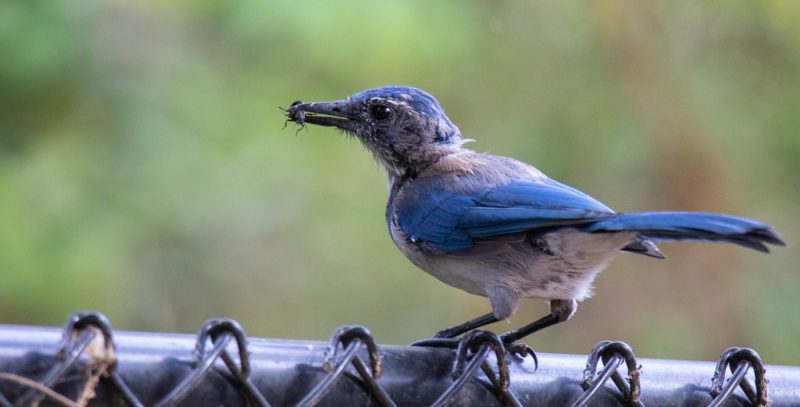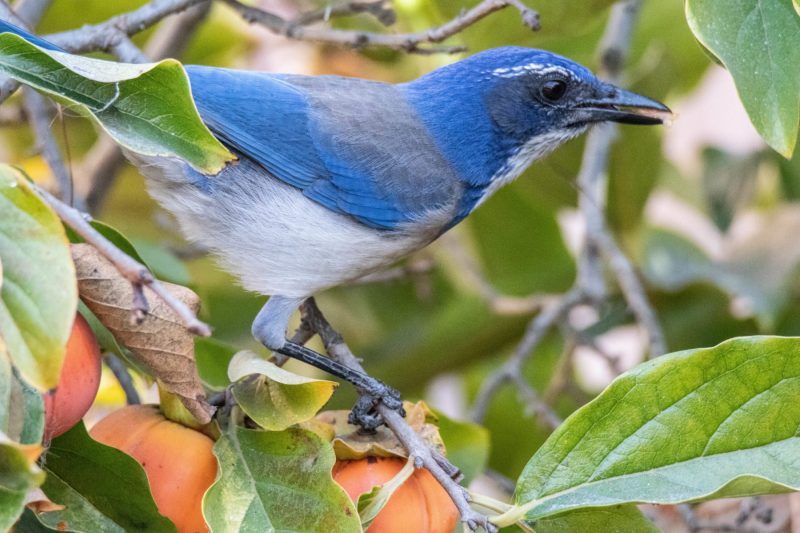Ubiquitous and beautifully blue…but out of focus.
I asked Katherine to proofread my post. She stared at the feature (first) image for a full minute. I thought she was admiring the photo; yes, it was a fun photo, I thought.
“Not your best picture,” she said. I felt déjà vu.
“But it’s funny!”
“It’s just not up to the standards that you’ve set.”
“Fine, I’ll choose another.”
Much too quickly, Katherine spotted another error.
“I think you mean corvid, not covid!”
Gee, I wonder how I could have made that mistake? 😂
And now for the actual post, inspected and improved. 😛
Katherine and I have seen many California Scrub Jays. This was the first year that we were able to identify a juvenile. It’s color and behavior led us to think the below bird was a juvenile scrub jay. When we looked it up later, we confirmed that the juvenile California Scrub Jays are born gray, naked and helpless with closed eyes–otherwise known as altricial. As the baby grows, some of their coloring changes to a beautiful blue.

The juveniles will leave the nest after about eighteen days. I have read that altricial birds who spend more time with their parents are more intelligent than precocial birds (who are born ready to leave the nest within hours or days).
And, in fact, the California Scrub Jay is a member of the highly intelligent corvid family.
“The brain-to-body mass ratio of adult scrub jays rivals that of chimpanzees and cetaceans, and is dwarfed only by that of humans. Scrub jays are also the only non-primate or non-dolphin shown to plan ahead for the future (known as metacognition), which was previously thought of as a uniquely human trait.”
https://en.wikipedia.org/wiki/California_scrub_jay
Wow!
California Scrub Jays can remember over 200 caches, what type of food is in the cache and when that food will “expire.” When they put food in a cache, they will use tricks to make sure no one is watching.
At Neary Lagoon recently, Katherine and I watched a California Scrub Jay hide its almond. Based on the grayish-colored head, we both believed it was a juvenile.





We watched this juvenile scrub jay try three or four locations before it was satisfied with his choice. Or, it might have been trying to throw potential thieves off its scent. It didn’t seem to have any of the tricks California Scrub Jays are known for.
FUN FACT: A California Scrub Jays can carry more than one nut in its beak.

In addition to nuts, California Scrub Jays eat seeds, insects and fruit. Insects and fruits are more of a spring and summer diet while nuts and seeds are generally their winter fare.
(Click on a photo below for a larger view.)
What is a group of jays called? They have many names, including a “band,” “cast,” “party,” and “scold.” I’m pretty sure we can see how some of these names came about!
Below is a photo of a California Scrub Jay hurrying to rejoin his party of jays. 😀

Okay, don’t tell Katherine but here’s the photo she shot down. Not literally, of course.



[…] some birds will pretty quickly learn to poop over the nest, others (altricial young…see this post for a brief mention of altricial and precocial) who remain in the nest for longer periods, generate […]
Always love the scrubs. Great info 🙂
Thanks! Glad you enjoyed it! Welcome to the blog!!